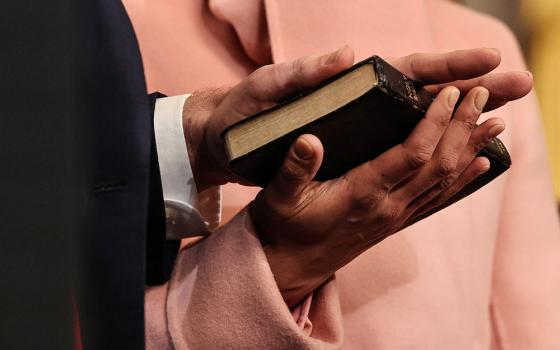From time to time, Vatican officials are accused of living in a bubble, detached from the complex and sometimes harsh realities facing ordinary people. However accurate that may be in individual cases, it’s certainly not the story of Brazilian Archbishop João Bráz de Aviz, 64, appointed in January as the new prefect of the Congregation for Institutes of Consecrated Life and Societies of Apostolic Life.
Consider these details from his biography:
- Bráz grew up in a poor family in the southern Brazilian state of Paraná, with four brothers and three sisters – the youngest sister, today 47, has Down’s syndrome. His father was a butcher.
- His surroundings were so rural that when a child was born, the family had to travel by horse-drawn carriage for 25 miles to have the baby baptized. A priest visited their area once a month, so popular lay leaders were in charge of catechism, worship, and devotional life.
- As a young priest, Bráz was once on his way to a village to say Mass when he stumbled upon an armored car robbery. He was shot during the crossfire, with bullets perforating his lungs and intestines and one eye. Although he survived and surgeons were able to save his eye, he still carries fragments of those bullets in his body.
In a recent interview with the prestigious Italian journal 30 Giorni, Bráz, who's very close to the Focolare movement and its spirituality of unity, spoke about his upbringing as well as the challenges he faces as the Vatican’s point man for religious life. The interview was conducted by veteran journalist Gianni Valente.
With striking candor, Bráz refers to a breakdown in trust between the Vatican and many religious orders because of "some positions taken previously." The reference is to his predecessor, Slovenian Cardinal Franc Rodé, who repeatedly decried a “crisis” in religious life following the Second Vatican Council (1962-65), related in part to what Rodé regarded as excessively liberalizing currents in some communities.
Without denying that there are problems, Bráz said, his main aim is to “rebuild trust” by approaching issues in a new way – “without preemptive condemnations,” he said, “and by listening to people’s concerns.”
Bráz, whose early years as a seminarian and priest coincided with the rise of Liberation Theology in Latin America, offers a largely positive evaluation of that movement, and expresses admiration for heroes of progressive Catholicism such as Archbishops Oscar Romero of El Salvador and Hélder Câmara of Brazil. He also discusses the ongoing visitation of women religious in the United States, as well as the Legionaries of Christ.
Among other things, Bráz reveals that when he was the Archbishop of Brasilia, he removed his seminarians from seminaries operated by the Legionaries out of concern for what he saw as a "lack of trust in personal freedom."
The following are excerpts from the interview, in an NCR translation.
* * *
In Latin America, you found yourself facing the emergence of Liberation Theology.
We were idealists. We wanted to devote our lives to something great. The option for the poor gave us great hope, above all for those of us who came from poor families. We were ready to give up everything, even the seminary, if that impulse had not been welcomed and embraced by the ecclesial realities in which we lived.
With the passage of time, what judgment do you make of the ecclesial period associated with Liberation Theology?
Different things can be said. In Brazil, some of the pastoral groups from that era which were most driven in the direction of liberation theology today have been transformed into NGOs with a great deal of money, having left the church. They said they wanted to change the church, but the faith dropped off and what was left was sociology. That can’t help but make one sad. Yet I remain convinced that in this period, something great happened for the entire church. For example, there’s now awareness that human sin creates structures of sin. Also, the preference for the poor is God’s choice, as one sees in the Gospel.
In the early Christian communities, the four pillars which carried the faith were fidelity to the doctrine of the apostles, the Eucharist, prayer, and finally a fraternal communion which was not sentimentalism but something practical – helping the widows and the orphans, pooling goods together. On that basis, one could see that the community lived in the presence of its Lord. Today we hide our goods away, locking them up tight, even in religious communities.
Sometimes, it’s said that Liberation Theology remains an imminent threat.
Yes, sometimes it seems that Liberation Theology is a ghost to be invoked whenever it suits someone. Many things have changed. In many countries, those who once fought against the powerful, like Lula [in Brazil], who were even guerilla warriors, today are in government. There’s been a whole evolution, and it’s time for everyone in the church to realize it.
In Brazil, from the time of independence, there’s always been a strong power that I would call “the power of money.” It’s the power, for example, which continues to resist a real agrarian reform. It’s never had a truly close relationship with the church, and not even with the ecclesiastical hierarchy. The church does not receive financial support from the state, and even the churches are built solely by funds from the people. Usually, those who give the most are the most poor.
What do you think of the beatification cause of Oscar Romero?
There are always details that have to be carefully evaluated in beatification causes, including scientific matters related to a requested miracle. That said, I believe that in terms of living a holy life, Romero is a great example. He was a bishop who, with the episcopacy, received in a very clear way the grace of being a pastor of his people in a situation marked by terrible violence. The same thing happened in Brazil with Dom Hélder Câmara. When we heard him speak during the military regime, he made us tremble with emotion. He was a person who enchanted us, a man of prayer. I think there are many such people who, slowly, with time, we understand better. We can see that their whole life was impregnated [by prayer], because they would not have offered their lives as they did. Câmara always lived aware of the possibility that he might be killed. They didn’t kill him only out of fear for how the people would have reacted. Instead, they sent pretty clear warnings: Instead of the bishops, they killed the secretaries of the bishops, as happened with the secretary of Dom Hélder.
How has your work in the Congregation for Religious begun?
We’ve had to confront many difficulties. There was little trust on the part of the religious, on account of some positions taken previously. Now, the focal point of the work is precisely that of rebuilding a relationship of trust. I work together with the secretary of the congregation, Archbishop Joseph Tobin. We talk a lot, so that decisions are taken in common.
How is the inspection of the women’s religious congregations in the United States going?
That, too, has not been an easy matter. There was mistrust and opposition. We’ve spoken with them, and their representatives have come here to Rome. We’ve started to listen again. That’s not to say there aren’t problems, but we have to deal with them in a different way, without preemptive condemnations and by listening to people’s concerns. By now, we’ve received many reports which we have to work through. There’s also the relationship with Mother Clare Millea [appointed by the Vatican to head the visitation], which will be important.
What does the scandal surrounding the founder of the Legionaries of Christ mean to you?
Certainly it’s painful when you see the expansion of a movement that presents itself as charismatic, and then the unworthiness of its initiator is revealed. How such a thing is possible remains a mystery, and the Legionaries aren’t the only instance. In Brazil, we had the case of Toca de Assis. It was a community which wore a Franciscan-style habit and which got a lot of attention, inserting itself into the Canção nova [a Brazilian network of groups loosely affiliated with the charismatic movement]. They created a strong image of themselves, with brothers who claimed to render glory to God by singing and dancing. They had recruited six hundred young men. It was later discovered, however, that the founder engaged in morally unworthy behavior with his followers.
As far as the Legionaries go, I was never convinced by the lack of trust in personal freedom that I saw in their structures. It was an authoritarianism that sought to dominate everything with discipline. I took the seminarians of Brasilia out of their seminaries, because I saw that things couldn’t go on that way.




